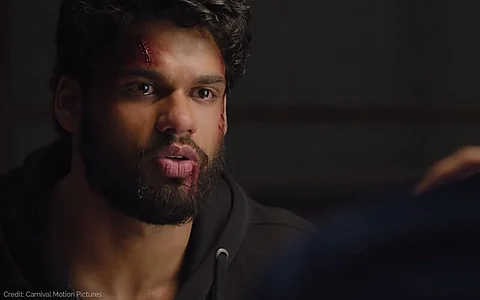
- Reviews
- Power List 2024
- Cannes 2024
- In-Depth Stories
- Web Stories
- News
- FC Lists
- Interviews
- Features
- FC SpecialsFC Specials

Director: Behzad Khambata
Cast: Sunny Deol, Karan Kapadia, Karanvir Sharma
At one point in Blank, a movie whose title might invite the wit of several film critics, ATS chief Dewan (Sunny Deol) finds himself facing an alarmed surgeon. The hospital's newest patient appears to be an unconscious suicide bomber. But an unusual one – there is no jacket involved, the device is stitched into his chest. Worse, the guy has short-term memory loss. In the grand tradition of Hindi movie doctors, the white-coated man proceeds to painstakingly explain the problem to Dewan: "Oh my God, the electrodes are connected directly to his heartbeat. This is a dead man's switch. If he dies, the bomb explodes…" To which Dewan's response is perhaps the most accurate reflection of the actor playing him: "Ek line mein bolo, bomb niklegi ya nahi?" All the technical mumbo-jumbo is too much to process; Dewan, Deol, has no time for niceties and intel and anything that requires a polite exchange of information.
I've always liked Sunny Deol in that sense. His "dhai kilo ka haath" is an old joke, but there is truth to the phrase in the way he has postured the old-school actioner image. He knows his limitations, which is why he often riffs on the role of a simpleton: a societal misfit whose pious idealism is elevated into the realm of no-nonsense heroism. In Blank, he keeps walking out on his boss with utter disdain (I could swear she even rolls her eyes), abruptly screams at anyone who speaks in softer tones, hangs up on a son who has been arrested from a rave party and cuts short a lofty Jihadi speech with a bullet. This Hulk-style rage (the Avengers scene where Hulk smashes a verbose and eloquent Loki to pulp comes to mind) makes many of Deol's characters somewhat endearing – almost as if they were rebelling against not only injustice but also the complexity of the films and plots occupied by them. But Blank isn't a movie – unlike, say, a Ghayal Once Again – that is socioculturally designed to enable his one-man-mission bravado. The situation isn't one that Dewan can tear through; it tries to be too smart, too broadly themed, for him. As a result, Deol's spirit is sidelined from the story. Almost as if to compensate for his rather human arc here, we see some strange last-ditch treatment by the makers: When he heads to conquer a Jihadi camp with his ATS team in the cover of darkness, the men slap their knees in unison to provide the beats to a motivational background song named "Himmat Karja". On another day, they might have been willing the aura of Deol to hijack a movie about conflicted bad guys.
Soapy craft and writing aside, the problem lies in the film's facile politics. Given its release in the midst of the country's Lok Sabha Elections, it's not surprising to see a star in service of a statement. But the grammar of this statement is hard to get right. Dewan, who battles against time to track down a network of sleeper cells across the "city with a chalta hai attitude," is pitted against a villain named Hanif (Karan Kapadia), who looks more like a disgruntled engineering student. Hanif gets a lot of footage, as does his two-faced personality. Dewan's colleagues chase down suppliers and terrorists in Muslim localities; each of them is sneaky or aggressive. The last act attempts to highlight the Good-Muslim-Bad-Muslim narrative as an afterthought – and through an "Allah" end credits song featuring Akshay Kumar. A 2002 flashback sequence is presented as a turning point in a reductive film that turns religious discord into something of a gimmick.
Speaking about gimmicks, I remember being quite taken by the psychology of Neeraj Pandey's A Wednesday back in 2008. The politics were of course lost on my young, impressionable mind. Naseeruddin Shah's "aam aadmi" monologue felt frighteningly relevant to our times. Not much has changed in 2019. Anupam Kher led the mission with his brain in that one; Sunny Deol misleads with brawn in this one. What do they have in common today, apart from a long and distinguished career in Bollywood? Fill in the blank.